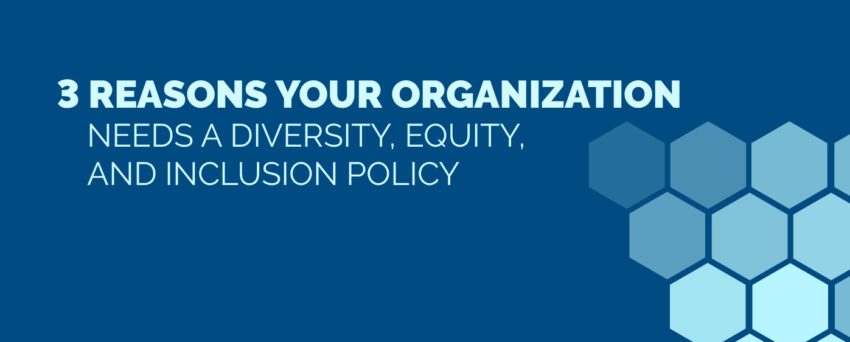18Apr 2023
Diversity, equity, and inclusion (DEI) initiatives have developed in popularity in recent years, and for good reason. According to one study, 81% of employees in American companies would consider leaving their current employer if the organization lacked commitment to DEI. This sentiment is echoed across many industries, with a recent report by the American Bar Association now suggesting that lawyers’ work on DEI issues should count towards billable hours.
So what is a DEI policy? And why is it something every organization needs?
What is the purpose of a DEI policy?
DEI initiatives vary by country, industry, and location. However, in general, DEI policies are designed to cultivate a healthy and respectful workplace culture. They promote fairness and encourage representation or differences among employees in terms of age, ethnicity, disability, gender identity/expression, marital or family status, language, or any other characteristics that make employees unique.
In practice, these policies ensure practices like recruitment, compensation, or promotion are transparent and fair to those involved. They mandate employees treat others with dignity and respect and set out consequences and reporting procedures for breaches in conduct.

Why are they important?
The benefits of a DEI policy go beyond workplace morale. Research from McKinsey suggests that successful (and impactful) DEI policies can directly boost operational efficiency and financial performance. They can also improve:
- Burnout and stress
HR experts suggest investing in a DEI strategy not only promotes a healthy work environment, it also helps decrease burnout and stress. Research by Gallup suggests employees who feel discriminated against are more than likely to report feeling burned out as well. Employees who feel like they have the same opportunities as their co-workers (for example, their chance of getting a promotion or a raise) are less likely to feel the impact of long hours or a heavy workload.
- Employee retention
Targeted DEI initiatives are especially good for retaining your workers and supporting them throughout their careers. Programs that target the root cause of DEI issues (for example, women or minorities underrepresented among leadership roles) are not only helpful in improving the situation, they can also boost the number of employees your organization retains.
In one of McKinsey’s case studies on DEI leaders, organizers of Walmart’s DEI initiative found that frontline workers (39% of whom were Black/Hispanic) were less likely to move into higher-paying roles within the organization than other staff. Further research found that this was due to a lack of required skill sets or formal education and the time and cost it required to obtain. Their DEI initiative focused on intervening in these situations and led to a 20% higher rate of employee retention and a more diverse team.
Diversity among employees leads to more creative thinking, better decision making, and forward thinking overall. Not only can DEI programs make your organization a better place to work, but it can also help create long-term opportunities for your workforce.
- Risk management
Discrimination isn’t just harmful to an employee’s morale, it’s also illegal. Having a DEI policy in place helps establish clear anti-discrimination protocols ahead of time. Not only does this help keep up with your inclusivity goals and make sure your employees feel safe, but it also provides avenues for employees to report discrimination, harassment, or other concerns in the workplace. Internal procedures for dealing with these issues can prevent them from escalating into a larger problem.
Diversity, Equity and Inclusion are a huge priority here at DOCUdavit Solutions and we’re proud to say that we have our own DEI policy and have been DEI certified for 2023.

